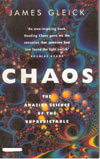«Chaos: making a new science», by James Gleick. A book review.
 Â
Â
This book only touches on what Chaos actually is. I found myself wanting more – NOT because it was a good book, but because I knew it was poorly written book on a good subject.
If you really like the image on the cover, then please do yourself a favour and go and search the internet for the phrase «Mandelbrot set», and you’ll come up with loads of pictures equally as fascinating (and you won’t have to read all those pages!).
I’m going to explain a few things first in this paragraph so you can understand the way the book is written. If my perception of the book is correct, the concept of Chaos itself, is that at first, an event appears as if it is purely random. But upon closer inspection, the underlying process is ordered, which makes the result only seem random. Chaos is not the same thing as randomness; it is a special type of randomness. Change the parameters only slightly, and the order is revealed. «Order in chaos» is the appropriate phrase that is repeated throughout the book. The other phrase that comes to mind is «sensitive dependence on initial conditions», which simply means that the outcome of an event is extremely susceptible to the initial circumstances. You could say that our lives are like that. Another easy example of a chaotic system is the weather – it changes all the time, with no apparent direction. Who knows exactly where an individual cloud will be in the sky ten years from now? However, it is all caused by the interactions of the inherently simple processes like evaporation from the sea, gravitational forces from the moon, etc. It looks random, when in reality, it is only /extremely/ complex.
The book takes forever to convey these fundamental ideas, which I’ve essentially explained to you in one or two paragraphs. There are a few nice examples, but overall, I think an unusual topic such as this needs many more real-life examples of chaos at work. This is one of those types of books that introduce all the many people who made this field of study possible. In my humble opinion, James Gleick would have been much better of writing about where chaos is seen in nature.
Perhaps all randomness is in a sense chaotic. I don’t know. I guess it depends on whether or not you think the entire Universe can be described in terms of physical laws. Some people will say that it can, others will say that it can’t. I’d probably say that by its very complexity, there isn’t (and won’t be) a computer, or a mind, or anything, powerful enough to effectively model everything and ultimately tell you what is truly random behaviour and therefore not chaotic.
This book did get me to think for myself a little, which is good, but now I think I’ll go and find another book on chaos or complexity theory, and it won’t be authored by James Gleick.





In all fairness to the man, he is not a scientist, he is a journalist and on that account I think he did a good job. I read the book myself too, and it made me think and I keep thinking. Of course I went on and searched and learned more about it. The web is a good source. As for myself, I think everything in nature is chaotic, if we define nature in the classical sense distinct from the underlying quantum world where apparently true randomness exists.